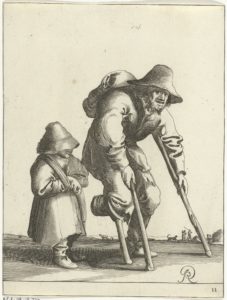A slop is a slum, a neighborhood with low quality housing. In some cities, like The Hague, the word slop was used for a particular little type of slum, a small alley in between main streets, lined with cheap housing. During the 1800s, many cities grew dramatically. Factories offered jobs, and drew many people from the countryside to the cities. Housing could not keep up with demand, and every little bit of space was used for housing. … [Read more...]
Quick tip – Who had the money?
When studying your ancestors, it is helpful to know who the rich people in the community were, even if your ancestors were poor. The rich people in the community may have interacted with your ancestors, and may have created records about them: Rich people may have employed them, for example as laborers, servants, or factory workers. They may have bought their products, for example in the case of shoemakers or weavers. They may have used their services, for example in the case of … [Read more...]
Dutch term – Armenjager
An armenjager is a poor hunter, an official charged with driving away beggars. By the end of the 1600s, poor economic conditions caused many people to turn to begging. Churches and towns provided for their own people, but strangers had no choice but to beg. To prevent these strangers from taking charity that could be used by the towns' own folks, some towns hired an armenjager to get rid of them. They were usually put across the border of the municipality or province to make them somebody … [Read more...]
Case study – Using population registers to tell a story
When you find enough evidence to answer your initial research questions, it is tempting to move on to another family. But you can discover a whole lot more if you make the effort to find all available records. In this case study, I will show you how you can find out more about the lives of your ancestors using information from Population Registers. Example: Maria Gommeren When I first researched my great-great-grandmother Maria Gommeren (1864-1918), I stopped looking for records once I proved … [Read more...]





